 Junior Brown sings and plays “Highway Patrol” in an undated TV clip:
Junior Brown sings and plays “Highway Patrol” in an undated TV clip:
(This is the latest in a series of arts-related videos that appear in this space each Monday, Wednesday, and Friday)
Terry Teachout on the arts in New York City
This is something I wrote a quarter-century ago in a memoir of my childhood and youth:
Memory is the key to a small town. A stranger driving through my home town would see nothing but schools, stores, and houses. Some are handsome, others nondescript, but all have one thing in common: the important parts are invisible, at least to eyes unaided by memory. This is why people like me never like to hear about how their home towns have changed since they moved away. Every change in the place where you grew up is an insult, a run in the homespun fabric of recollection.
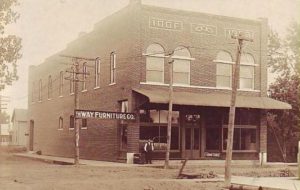 I still feel much the same way, which is why it saddened me to learn that the International Order of Odd Fellows Building, which has stood in the center of Smalltown, U.S.A., since 1908, was torn down the other day. It had to go: old age made the building structurally unsound, and after a passing storm caused the roof to cave in, no part of the rest of it could be saved. Still, I don’t like to think of so familiar a corner of my beloved home town now being “occupied” by a pile of rubble. The downtown districts of small midwestern towns, after all, aren’t exactly a growth stock, and I suspect that it will be a very long time before anything new goes up at this particular address. More than likely, its destiny is to look for many years to come like the gap left by a missing front tooth.
I still feel much the same way, which is why it saddened me to learn that the International Order of Odd Fellows Building, which has stood in the center of Smalltown, U.S.A., since 1908, was torn down the other day. It had to go: old age made the building structurally unsound, and after a passing storm caused the roof to cave in, no part of the rest of it could be saved. Still, I don’t like to think of so familiar a corner of my beloved home town now being “occupied” by a pile of rubble. The downtown districts of small midwestern towns, after all, aren’t exactly a growth stock, and I suspect that it will be a very long time before anything new goes up at this particular address. More than likely, its destiny is to look for many years to come like the gap left by a missing front tooth.
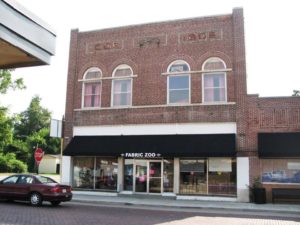 The Independent Order of Odd Fellows is itself a dusty anachronism, one of the many fraternal organizations and service clubs that, like Kiwanis, the Elks, and Rotary, used to be so prominent a part of the American cultural landscape. H.L. Mencken and Sinclair Lewis loved to whack them around once upon a time, but they are now as distant a memory as The American Mercury itself. While a few seem to be coming back, most of the rest are fast-fading relics of the days when men liked to get together of an evening to amuse one another instead of peering at their iPads in the hope of staving off ennui.
The Independent Order of Odd Fellows is itself a dusty anachronism, one of the many fraternal organizations and service clubs that, like Kiwanis, the Elks, and Rotary, used to be so prominent a part of the American cultural landscape. H.L. Mencken and Sinclair Lewis loved to whack them around once upon a time, but they are now as distant a memory as The American Mercury itself. While a few seem to be coming back, most of the rest are fast-fading relics of the days when men liked to get together of an evening to amuse one another instead of peering at their iPads in the hope of staving off ennui.
I never went in for such collective amusements, being the least clubbable of people, but neither did I hold them in the jeering contempt that was Mencken’s specialty. He was, of course, what we are now smugly pleased to call a “hater.” I’m not, and never have been: I’m all for innocent pleasures of every sort, and surely there are few things more innocent, or pleasurable, than belonging to a club that exists to do service to the community in which its members live and work. My brother belonged to such a club, the Jaycees, and he’ll be the first to tell you that it was one of the best things that ever happened to him.
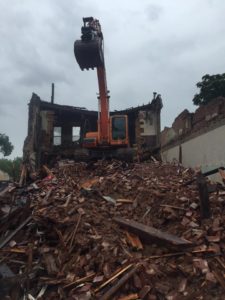 I don’t doubt that Smalltown’s Odd Fellows Lodge was no less beneficial to its loyal members, and that they were hugely proud of their second-story hall. But Lodge No. 358 is, so far as I know, defunct, which if true makes me almost as sad as does the demolition of its ancestral home.
I don’t doubt that Smalltown’s Odd Fellows Lodge was no less beneficial to its loyal members, and that they were hugely proud of their second-story hall. But Lodge No. 358 is, so far as I know, defunct, which if true makes me almost as sad as does the demolition of its ancestral home.
I think I’m pretty sanguine, for the most part, at the prospect of coping with change. I proved as much when I returned to Smalltown four years ago for a visit and discovered that my brother, who was then in the process of remodeling the house in which we grew up, had just cleared out my childhood bedroom. But I have my limits, and I think the city fathers might just have surpassed them when they tore down the Odd Fellows Building—though I shall, as always, endeavor to cope.
* * *
Thelonious Monk’s arrangement of “Abide With Me.” The horn section consists of John Coltrane, Ray Copeland, Gigi Gryce, and Coleman Hawkins:
Every film shot on location, whether in whole or in part, is a home movie in which bits and pieces of history are embedded, and I find myself growing increasingly fascinated by these snippets of lost time. I can’t watch North by Northwest, for instance, without thinking about how Grand Central Station has (and hasn’t) changed, or how the Plaza Hotel will never be again as it was.
This is, I suspect, as much a function of my increasing age as anything else. Just the other day, for instance, Backstage Books sent me a copy of the newly revised and updated edition of James Gavin’s Intimate Nights: The Golden Age of New York Cabaret. The earlier edition was one of my favorite books, but I found this version even more interesting, in part because it’s the first time I’ve read a work of history in which someone I used to know well figures prominently. That sort of thing doesn’t start happening to you until you’ve achieved a certain degree of seniority, and I’m there.….
Read the whole thing here.
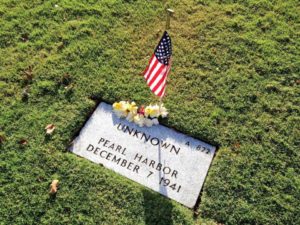 “I saw a woman in Central Park today wearing a T-shirt that said ‘America Was Never Great,’” a friend of mine tweeted over the weekend. I wasn’t surprised to hear it. My country contains many people who are contemptuous of its past, some of whom are no less dismissive of the men and women who endeavor to ensure that it will have a future. (Yes, makin’ mock o’ uniforms that guard you while you sleep/Is cheaper than them uniforms, an’ they’re starvation cheap.) All they can see are the flaws, of which there were and are many—many flaws and much honor.
“I saw a woman in Central Park today wearing a T-shirt that said ‘America Was Never Great,’” a friend of mine tweeted over the weekend. I wasn’t surprised to hear it. My country contains many people who are contemptuous of its past, some of whom are no less dismissive of the men and women who endeavor to ensure that it will have a future. (Yes, makin’ mock o’ uniforms that guard you while you sleep/Is cheaper than them uniforms, an’ they’re starvation cheap.) All they can see are the flaws, of which there were and are many—many flaws and much honor.
At no time am I more intensely aware of that honor, and the fearful toll that it exacted, than on Memorial Day. Mrs. T and I watched The Longest Day a couple of nights ago, and I found myself thinking: could I ever have done anything like that? I hope so, but I’ll never know, for history did not demand it of me.
And what did I miss, other than stark terror and the ever-present possibility of violent death? Justice Holmes, who fought and was wounded three times in the Civil War, summed it up in a speech that he gave on this day in 1884: “I think that, as life is action and passion, it is required of a man that he should share the passion and action of his time at peril of being judged not to have lived.”
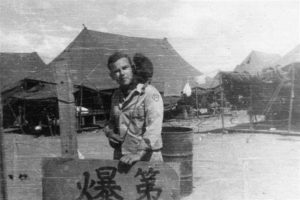 Whenever I read those words, I think of my late father, who served in the Army Air Corps during World War II. Though he never saw combat, he stood ready to do his duty, and I have no doubt that he would have done it without hesitation, just as he unhesitatingly saved me from drowning at the risk of his own life when I was a child. He was that kind of man. I hope I would have been the same kind under similar circumstances—but I’ll never know.
Whenever I read those words, I think of my late father, who served in the Army Air Corps during World War II. Though he never saw combat, he stood ready to do his duty, and I have no doubt that he would have done it without hesitation, just as he unhesitatingly saved me from drowning at the risk of his own life when I was a child. He was that kind of man. I hope I would have been the same kind under similar circumstances—but I’ll never know.
That is why I overflow with respect for those who, like my father, did what they had to do when their country asked them to do it. More than anyone else save for the Founders themselves, they made America great. I have no doubt—none whatsoever—that they always will.
* * *
“The Battle of Midway,” an official 1942 war documentary directed by John Ford. Some of the combat footage was shot by Ford himself with a handheld movie camera:
 Andrew Davis leads the BBC Symphony Orchestra and Chorus in the prelude and “Angel’s Farewell” from Sir Edward Elgar’s The Dream of Gerontius. The vocal soloist is Catherine Wyn-Rogers. This performance was telecast from St. Paul’s Cathedral in 1997:
Andrew Davis leads the BBC Symphony Orchestra and Chorus in the prelude and “Angel’s Farewell” from Sir Edward Elgar’s The Dream of Gerontius. The vocal soloist is Catherine Wyn-Rogers. This performance was telecast from St. Paul’s Cathedral in 1997:
(This is the latest in a series of arts-related videos that appear in this space each Monday, Wednesday, and Friday)
| M | T | W | T | F | S | S |
|---|---|---|---|---|---|---|
| 1 | 2 | 3 | 4 | 5 | ||
| 6 | 7 | 8 | 9 | 10 | 11 | 12 |
| 13 | 14 | 15 | 16 | 17 | 18 | 19 |
| 20 | 21 | 22 | 23 | 24 | 25 | 26 |
| 27 | 28 | 29 | 30 | 31 | ||
An ArtsJournal Blog